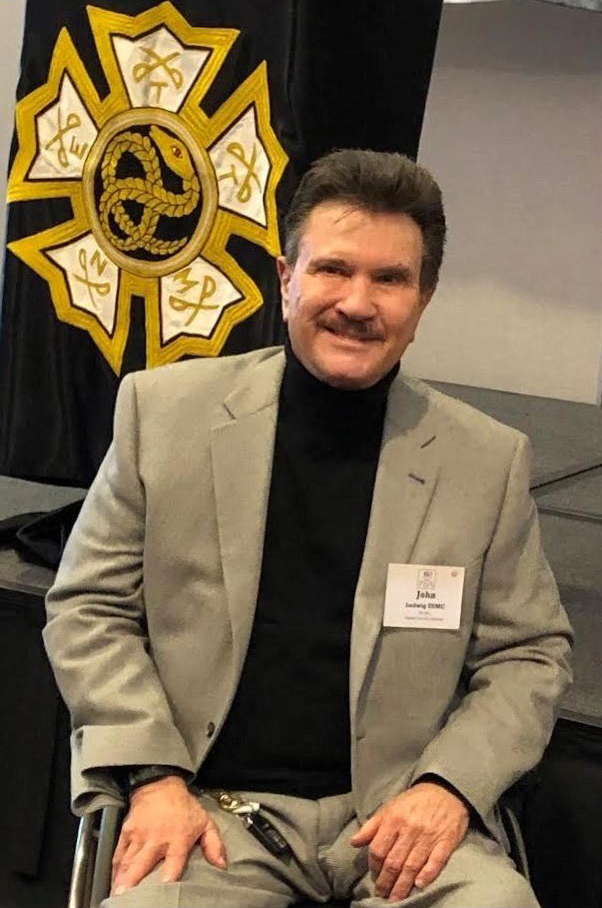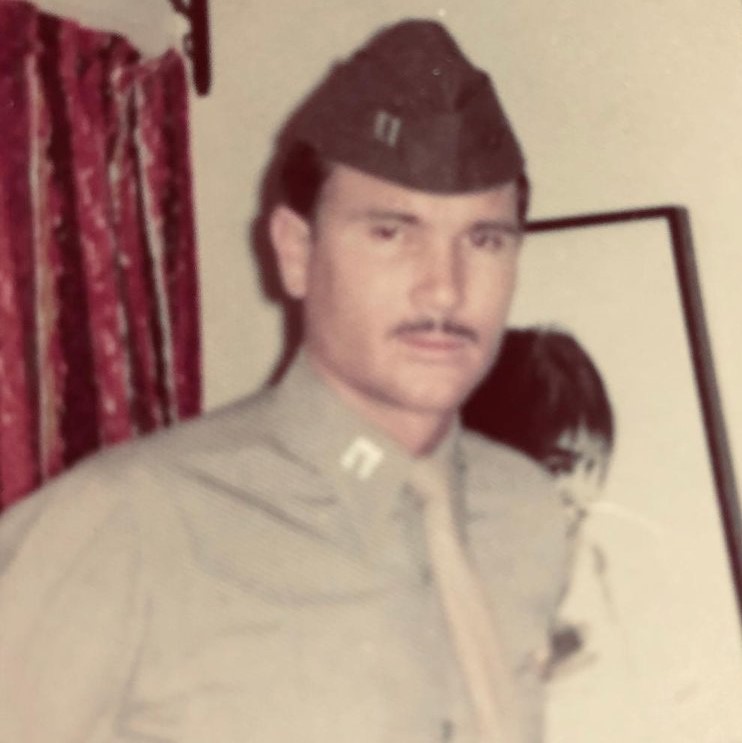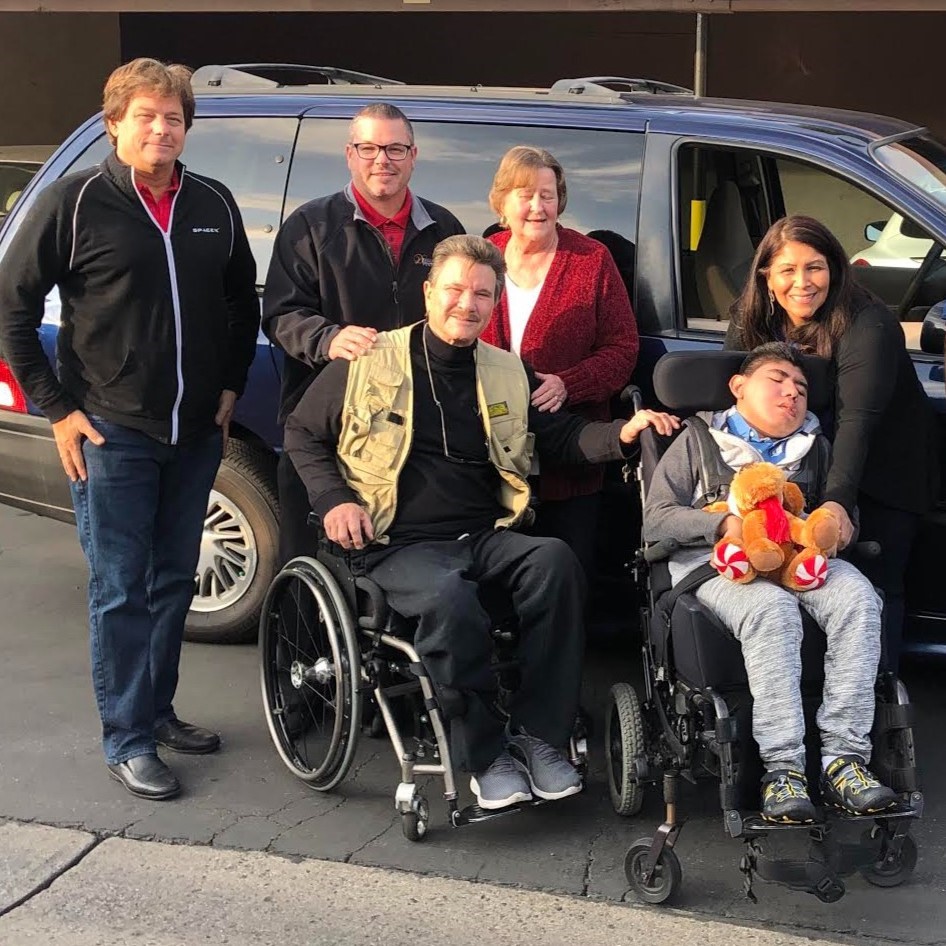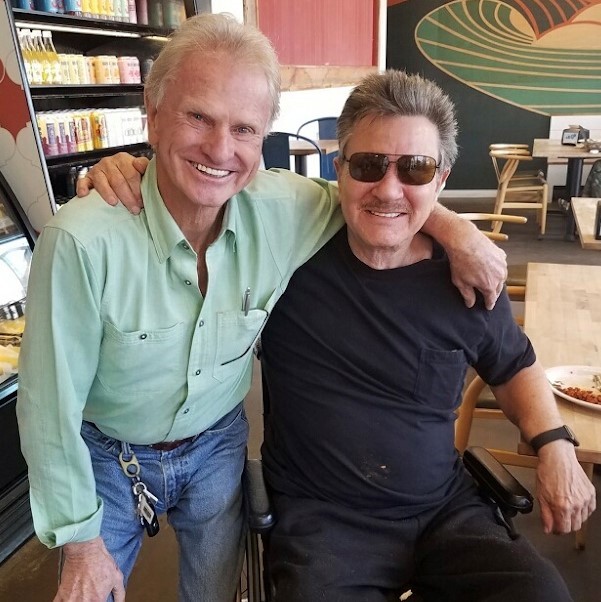A Life Well Traveled, John Ludwig (Western Kentucky) – A Brother That Still Has Many Miles To Go
By Art Kirsch and Vijay Blevins (Western Kentucky)
This story originally appeared in the Winter 2023 edition of the Eta Rho Chapter Newsletter.
 Growing up in Rahway, New Jersey, during his teens, John often went to a small grass airfield to take flying lessons in a J-3 Piper Cub, paid with money working after school hours at the local Dairy Queen. Becoming a pilot was John’s ongoing ambition. After graduating High School, John eventually attended Western Kentucky University, graduating (Jan of 1968) with a B.A. in Psychology and Sociology. He put himself through college with a mixture of hard physical labor during the summers and bar-tending at night at a local bar/restaurant in Bowling Green. John joined Sigma Nu Fraternity during his time at Western, and “although the wood pile is getting thinner,” he is still in touch with the brothers and the friendships created many years ago.
Growing up in Rahway, New Jersey, during his teens, John often went to a small grass airfield to take flying lessons in a J-3 Piper Cub, paid with money working after school hours at the local Dairy Queen. Becoming a pilot was John’s ongoing ambition. After graduating High School, John eventually attended Western Kentucky University, graduating (Jan of 1968) with a B.A. in Psychology and Sociology. He put himself through college with a mixture of hard physical labor during the summers and bar-tending at night at a local bar/restaurant in Bowling Green. John joined Sigma Nu Fraternity during his time at Western, and “although the wood pile is getting thinner,” he is still in touch with the brothers and the friendships created many years ago.
After graduating from Western “with hardly an exemplary grade point average” and having virtually no technical or math background, John scored high enough on his flight exam to be accepted into Marine Corps Officer Candidate School (OCS) with an Aviation Contract. While waiting for his OCS class to begin in the summer of 68, he worked in Harlem as a caseworker for the Department of Social Services in NYC.
OCS in Quantico, Va., and Flight School in Pensacola, Fla., presented his first significant structural and academic challenge. After a year and a half of OCS and flight training, he qualified in both fixed-wing and rotary aircraft. After tours in Asia and Europe and seeing the world from the decks of aircraft carriers, John finished his active duty commitment in Quantico, Va., with the sister squadron to the presidential squadron. Although he was selected for Major, he was medically retired with the rank of Captain. To this day, he is still close with his Marine Squadron pals.
After active duty with the Marines, John took a flying job with a foreign company that had various flight contracts throughout the world. He lived abroad for almost three years in Africa and the Middle East, flew the police helicopter in Johannesburg, South Africa, during their time of strife over apartheid, and did a stint culling and tagging white rhinos from the air in Umfolozi, a small game preserve in the heart of Zulu Land, just south of Mozambique. The closest village was 50 miles away. “In the evenings, I could see the eyes of various wild animals just beyond the clearing of my small hut. Nothing but the sound of the wild prevailed except for a generator that was turned off each night at 9:00 pm.“
Over a year was spent in Nigeria living in the tiny village of Eket (in the so-called “Bite” of Biafra), just north of Cameroon, flying the bush and supporting oil exploration off the coast. An interesting aside, he was there shortly after the war in Biafra, where the revolting tribes during the civil war were cut off from all exports of food and provisions.
In the mid-seventies, he moved from Africa to Abu Dhabi and Dubai, two of the Arab Emirates located on the Persian Gulf. It was an interesting time. Old traditions of the Bedouin culture clashed with the new emerging oil-rich societies of the nouveau riche.
Old Souks (think Indiana Jones, narrow alleys with tents filled with wares) were slowly replaced with modern shopping centers. John flew for local sheiks supporting their new oil industry, sometimes landing in the desert to fill his helicopter with gas from Jerry Cans, pausing long enough to join in for a cup of coffee in one of the many nomadic Bedouin campsites sprinkled through the Sahara.
The Middle East was his last location before returning to the States after a few years of being abroad, where he thought he was ready for more stability and moved to Dallas to join the girl he left behind some years before. He had several business ventures, opening up a new Dallas nightclub, among others, but eventually, put his energy into helping a new aircraft brokerage company get off the ground. Entrepreneurial businesses require total dedication with regard to time and money, a lesson that has stayed with him to this day and made him appreciate what it takes to be successful in a start-up business.
 While continuing to feed his new business ventures, he joined a Marine Reserve Squadron in Dallas. He lived 15 minutes from the airfield, so he was able to earn extra money flying test flights during the week in addition to his one-weekend-a-month reserve commitment. It was the best of both worlds, being a civilian and flying part-time as a reserve pilot. Unfortunately, on his two-week reserve commitment and during a joint military exercise, he had a catastrophic crash that broke his back and rendered him a paraplegic confined to a wheelchair. A 50-cent cotter pin that was not installed caused a $30 million CH-53 Sea Stallion helicopter to go down in a catastrophic crash. He never had to ask why, especially in light of his past flying experiences. “I figured my number came up.” He then started to figure out how to deal with this abrupt change of lifestyle.
While continuing to feed his new business ventures, he joined a Marine Reserve Squadron in Dallas. He lived 15 minutes from the airfield, so he was able to earn extra money flying test flights during the week in addition to his one-weekend-a-month reserve commitment. It was the best of both worlds, being a civilian and flying part-time as a reserve pilot. Unfortunately, on his two-week reserve commitment and during a joint military exercise, he had a catastrophic crash that broke his back and rendered him a paraplegic confined to a wheelchair. A 50-cent cotter pin that was not installed caused a $30 million CH-53 Sea Stallion helicopter to go down in a catastrophic crash. He never had to ask why, especially in light of his past flying experiences. “I figured my number came up.” He then started to figure out how to deal with this abrupt change of lifestyle.
He spent seven months in rehab at the V.A. hospital in Long Beach, Ca. and moved to the beach as an outpatient. He decided to enter Graduate School during this time and, upon receiving his degree, spent two years interning at a local counseling center, after which he became a State Licensed Family Therapist. Ever the entrepreneur, he opened up a counseling clinic with a partner and served concurrently as part of the clinical staff of a research center under the world-renowned bio-engineer Dr. Jerold Petrofsky. The clinic specialized in different treatment modalities for central nervous system disorders. In addition, he taught for the Graduate School of Psychology at Pepperdine University as an Adjunct Professor.
Wanderlust started to grab hold of him by the mid-80s, and he felt it was once again time for adventure. However, starting a solo trip from the confines of a wheelchair was a new experience. The urge was strong enough that after arranging for his partner to cover their practice, he packed his car and took off down the Baja peninsula, eventually crossing over to mainland Mexico. Going a day at a time with no itinerary, after nearly a month on the road, he arrived at what became his spiritual home away from home, a small village, Ajijic, in the foothills of the Sierra Madras on Lake Chapala. Ajijic and Chapala during this time had a Hemmingwayesque atmosphere where slices of humanity made for great conversation at lakeside gathering places. Drug dealers, writers, ex-cons, and artists all converged to make life there interesting. He eventually built a home on the side of the mountain overlooking the lake and village. It became his spiritual home, and he spent time there whenever he could get away from work.
From that point forward, he realized that solo trips to faraway places, with no itinerary and maybe just a plane ticket in hand, had become even more of an obsession despite his physical condition. “There is something seemingly romantic and exciting about being alone, raw, and having to trust the universe that all will be OK.”
 These existential journeys have continued over the years. John was in Albania in the 90s on a humanitarian mission just before the Kosovo uprising and then traveled by land to Sarajevo after its collapse. On his way to Bosnia-Herzegovina through Montenegro, he was detained by Serbian police and
These existential journeys have continued over the years. John was in Albania in the 90s on a humanitarian mission just before the Kosovo uprising and then traveled by land to Sarajevo after its collapse. On his way to Bosnia-Herzegovina through Montenegro, he was detained by Serbian police and
spent time in a Serb relocation camp for several days before they realized he was too dumb to know where he had traveled. John eventually reached Sarajevo, a city still under strife, which necessitated him to leave the Balkans through Croatia, not wanting to declare himself a political liability.
John traveled through Israel during the time of the Palestinian uprising. A Palestinian got him into the West Bank when Hebron and Bethlehem were off-limits and were ghost towns. The Church of Nativity was overtaken three days later and made international news.
He traveled throughout Salvador after the war. He trekked across Thailand and Cambodia for over a month. He joined a friend who lived in Quito, Ecuador, four-wheeled it down the mountain through triple canopies and waterfalls, and after three days, arrived at a tributary that joined the Amazon, where they canoed.
John then traveled to Peru during the uprising of the Shining Star as part of a humanitarian group that brought supplies to a small village atop the Andes where no roads or electricity existed and where at night, as John described it, the “Milky Way was almost a solid ribbon.”
These are just a few of his travels, all having special moments that made him realize “the paradox of life as we know it: feeling so infinitesimally small yet at the same time feeling completely symbiotic with the whole of the universe.
At the age of 60, he took up one of his lifelong passions--to write, direct, and produce film--and thought that some of his experiences would lay a foundation for his writings, grist for the mill. – He enrolled in film school for a short time, gaining just enough knowledge to pursue his passion. He spent a year writing, casting, and directing a short film titled “The Unbroken Circle,” a tri-lingual film that portrays the conflict and sad conditions that continue to envelop the Middle East. He was fortunate to gather a few national and international awards on the festival circuit for this piece. An adaptation of his original screenplay “Remembrance” may still be developed into a feature. Although John continues to write, his passion for film has led him to establish the John C Ludwig Production Grant at the local college. An ongoing Grant that helps student filmmakers with their project funding. It also helps keep him in the creative loop. In 2018, John established Muriel’s Angels, a 501(c)(3) charity that helps provide for families that have children with disabilities whose needs are not met by state or federal funding. “It is a cause that is close to my heart, knowing that some of the children and their families are not so fortunate to have the ability to pay for simple needs that makes their life more bearable.”
 Over the past 20 years, John has been a member of The Red Cross Mental Health Disaster Team and Red Cross Service to the Armed Forces.
Over the past 20 years, John has been a member of The Red Cross Mental Health Disaster Team and Red Cross Service to the Armed Forces.
He is also a member of various other Civic organizations: The Elks, Paralyzed Veterans of America, and the American Legion, to name a few.
In closing, John gave his parting thought: “Although Life may present many unexpected challenges, the one thing that helps one through those challenges is to have family and the brotherhood of good friends that are always there. I am fortunate to have them in spades.”